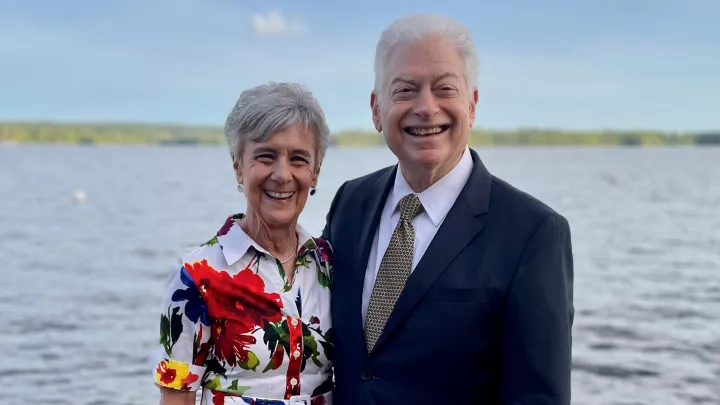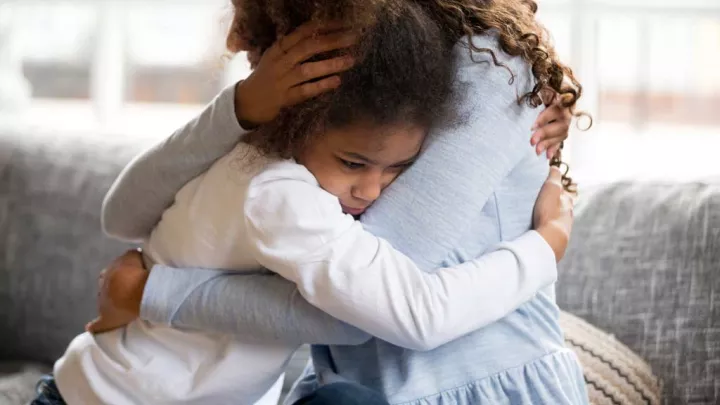
What is Infant Mental Health? Your Questions Answered
We usually think about the mental health of older teens and adults. But what does mental health mean for babies? Marian E. Williams, PhD, Clinical Psychologist and Director of the Stein Tikun Olam Early Connections Program at Children’s Hospital Los Angeles, helps explain the concept of infant and early childhood mental health.

What is infant mental health?
Dr. Williams: Infant and early childhood mental health has to do with the social and emotional development of children ages 5 and under. It includes bonding with important caregivers, learning to express emotions and be curious about the world around them, and learning new things. When we talk about an infant’s mental health, we focus on how their relationships with adults help them to feel loved, protected, safe, and cared for so they can grow, develop, and thrive. In fact, we often use the term “early relational health” to highlight this focus on relationships.
Are there certain children or families at higher risk for challenges with their social-emotional well-being?
MW: Research shows that experiencing multiple stressful events during childhood can lead to long-term health challenges, including mental health. That is why noticing challenges and providing support early is so important. One example of traumatic stress is the experience of repeated, painful medical procedures or extended hospitalization. Infants show signs of stress such as difficulty sleeping or eating, crying inconsolably, difficulty relating to others, or long and frequent tantrums. Having a nurturing relationship with a parent or other loving caregiver can help children cope with stressful experiences. Children with developmental delays may also be at a greater risk for mental health challenges. Mental health support for both the young child and their family can help children develop resilience so that they can deal with the effects of difficult times.
How do you assess mental health issues in infants and young children, especially those who are non-verbal?
MW: When an infant or young child is showing signs of mental health or social-emotional challenges, dealing with problems early is critical. This is best done by infant mental health specialists—psychologists, psychotherapists, and other mental health professionals trained to work with children 0-5 years and their families. The first step is assessment: Infant mental health specialists partner with families to understand their child’s needs. They carefully evaluate the child’s symptoms and level of distress, the relationship between the young child and their caregivers, and the impact of any stressful experiences.
Marian E. Williams, PhDYoung children can’t always tell us with words what they are feeling or what they need. Infant mental health specialists observe infant cues, such as the tone of their cries, their eye gaze, and their facial expressions to pick up on signs of stress.
Young children can’t always tell us with words what they are feeling or what they need. Infant mental health specialists observe infant cues, such as the tone of their cries, their eye gaze, and their facial expressions to pick up on signs of stress.
We also observe the interaction between the infant and their caregivers. This tells the story of their attachment relationship. We look for signs such as:
- Can the infant signal in clear ways what they need?
- Does the parent need help to recognize and respond to the infant’s cues?
- How easily can the child be soothed when they are upset?
- Do the parent and child enjoy each other, interacting with joy and playfulness, or is something getting in the way?
These interactions can be observed in everyday activities such as feeding, dressing, changing diapers, holding, and playing.
After you identify a mental health need, what sorts of interventions do you recommend?
MW: A treatment plan includes input from the family and other health care providers who know the child.
Sometimes only brief intervention is needed. For example, developmental guidance helps with common early childhood challenges—helping a child fall and stay asleep, encouraging them to enjoy healthy foods, or soothing a fussy baby. Other families need support while their child is hospitalized. Sometimes a group can help parents learn about child development, what their child is communicating with their behavior, and how to make children feel safe and protected.
Children who have experienced more traumatic events may need more therapy. Traumatic events can be things like exposure to violence in the home, placement in foster care, or repeated pediatric medical traumatic stress. Weekly therapy sessions include the parent and child together. For example, in a toddler or preschool-age child, the therapist chooses toys that help the child to play out the scenes from their difficult experiences. The parent learns to describe and join the child’s play, showing their child that they understand what they have been through. The parent becomes the protective “shield” who helps the child feel safe and loved. For an infant, therapy supports attachment and bonding through developmentally appropriate parent-child interactions.
How do you help kids with developmental delays or other medical conditions, whose needs may be more complex?
MW: We work closely with providers from different disciplines, together with the child’s parent or caregivers. CHLA works to identify potential problems early through the Stein Tikun Olam Early Connections Program, and our Newborn Follow-up Program. For example, a child who has experienced a painful medical procedure involving their mouth or digestive track may resist putting food in their mouth. This can lead to feeding difficulties that affect growth and development. In this case, infant mental health therapists partner with specialists from Occupational Therapy, Nutrition, Gastroenterology, Developmental-Behavioral Pediatrics, and Speech-Language Pathology to come up with the best treatment plan.
In other cases, a child’s tantrums may be related to speech and language delays which cause frustration. Partnering with a speech-language pathologist, we integrate language enrichment activities into mental health treatment. Therapists help parents learn to match the child’s developmental level, follow their child’s lead in play, and support their child’s growing ability to engage in back-and-forth interactions.
What signs should parents and caregivers look for that might mean they should seek help for their child?
MW: All infants and young children have periods of time when they are more fussy or irritable than usual. This can result from typical life changes such as a move to a new home, brief illness in the baby or caregiver, changes in daycare, or the birth of a sibling. They can also occur at “touchpoints” in development when a child has spurts in one area of their development accompanied by a temporary regression in another. All of this can be confusing for parents and make them doubt themselves. Extra attention, reassurance, and keeping familiar routines often helps a baby get back to their usual self within a week or two following these types of changes.
Signs that a baby may need more help include:
- Inconsolable crying
- Refusing to eat
- Not cuddling
- Not smiling when a familiar adult is playfully interacting
In toddlers, signs also include:
- Severe temper tantrums
- Inability to separate from caregivers without extreme anxiety and prolonged distress
- Delays in language development
- Not engaging in playful social interactions
- Regression—when a child has reached a developmental milestone and then loses that milestone
We encourage any parent who is worried about their young child’s social-emotional well-being to seek help from their pediatrician or reach out to a birth-to-five mental health provider for evaluation. Parents know their baby best, so if a parent is worried, it is important to explore what may be going on. Often a brief intervention or developmental guidance from a professional is enough to get things back on track quickly.


